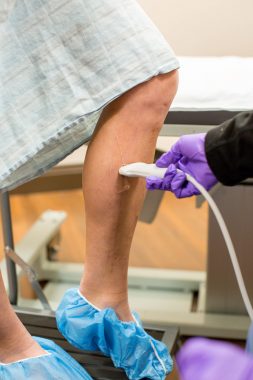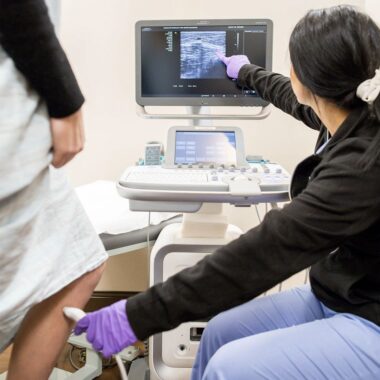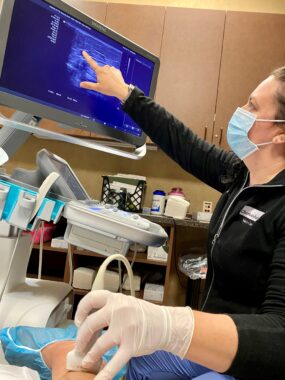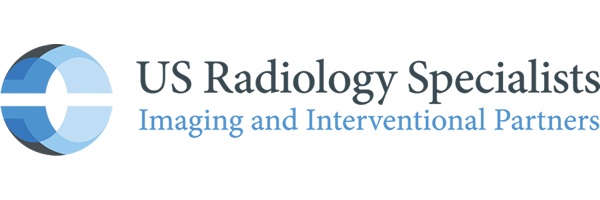The Importance of Vein Health
 Your veins deserve some love. Why? Taking steps to improve your vein health boosts your overall wellness. It can also make a world of difference to your confidence and self-image to know that your first impressions are not affected by unsightly veins.
Your veins deserve some love. Why? Taking steps to improve your vein health boosts your overall wellness. It can also make a world of difference to your confidence and self-image to know that your first impressions are not affected by unsightly veins.
Common vein problems include:
- Spider veins. Thread-like and jagged in appearance, spider veins are usually red or blue. They don’t typically cause symptoms.
- Varicose veins. Varicose veins are thicker than spider veins. Often compared to twisted ropes, varicose veins can make your skin bulge — and your legs ache. These veins can cause pain and swelling, as well as itching and a tired feeling in your legs.
Life can get busy, but if damaged veins are keeping you from the activities you love, it’s important to make vein health a priority.
Improving your vein health can reduce your risk of varicose vein complications. These include blood clots in a deep vein, which is known as deep vein thrombosis, and skin ulcers. Healthier veins can also lead to less leg pain, helping you feel better and move with ease. Addressing your unhealthy veins can help you feel more confident about letting your legs shine — and yourself glow. Let’s explore your options.
Read More: Take Our Vein Disease Risk Assessment
Exercise and Your Veins
Physical activity, weight and vein health are all linked. Being overweight or obese increases your risk of vein problems by putting extra pressure on your blood vessels. Additionally, if you sit or stand for too long, the veins in your legs have to work harder, which puts them under more stress, becoming more susceptible to issues down the road.
Exercise strengthens your muscles, which helps your leg veins push blood toward the heart. Plus, exercise is a great way to maintain a healthy weight. Follow these tips as you exercise with vein health in mind:
- Ask an expert. Before you start an exercise regimen, consult your primary care provider or a vein health expert about what types of exercise are safe for you. If you have varicose veins, rigorous exercise can make them worse. Your provider may recommend low-impact activities, such as walking or biking.
- Look for opportunities to fit exercise into your day. A busy schedule can make it hard to regularly exercise, but your day might include more opportunities for activity than you think. You can take a walk on your lunch break, move around during calls with friends, family, or coworkers, and do leg exercises such as calf and thigh raises while working or watching TV.
- Strike a healthy balance between sitting and standing. If you have varicose or spider veins, you shouldn’t sit or stand for more than 30 minutes without taking a break to walk around, according to the Office on Women’s Health. Set recurring reminder alarms on your phone or watch to move around. If you have a standing desk, shift your weight periodically, and alternate between standing and sitting.
Diet and Vein Health
Along with exercise, a nutritious diet is a key part of achieving and maintaining a healthy weight — and improving vein health. To help your veins, you can:
- Drink plenty of water. Hydration helps circulation and supports muscle function, both of which are good for your veins.
- Fill up on fiber. Fiber can help you feel full faster, which can prevent overeating. In addition, fiber helps your digestive system function, and research shows it can help prevent abdominal pressure from affecting your veins. Good sources of fiber include spinach, broccoli, beans, whole-wheat bread and popcorn.
- Get your vitamins. Vitamins C and E are beneficial for vein health. You can find vitamin C in oranges, grapefruits, bell peppers, broccoli, strawberries and tomatoes. Sources of vitamin E include almonds, peanuts, sunflower seeds, spinach, broccoli and avocados.
- Give your diet a Mediterranean makeover. The Mediterranean diet is associated with improved vascular health. Staples of this diet include fish, which are rich in beneficial omega-3 fatty acids, plenty of colorful fruits and vegetables, whole grains, such as oats and barley, beans, nuts, and extra-virgin olive oil.
- Use alternatives to salt. Too much sodium is bad for your blood vessels. Limit yourself to 1,500 milligrams of sodium per day. To do that, reduce your intake of processed foods, which are often high in sodium. Use herbs or spices, not salt, to flavor foods.
Read More: Learn About Varicose Veins
Additional Factors That Affect Vein Health
Certain risk factors for vein problems, such as aging and family history, are out of your control. However, you can act on some risk factors, including:
- Diabetes. Diabetes can cause a variety of problems for the vascular system. To reduce your risk, keep your blood sugar levels within their target ranges.
- Hormonal birth control or hormone therapy for menopause. The estrogen found in these treatments can increase your risk for varicose veins. Speak with your OB-GYN or primary care provider to find the right form of birth control or menopause therapy for you.
- Poor posture. Don’t stand or sit in the same position for too long. Switch positions often, and when sitting, keep your feet on the floor instead of crossing your legs.
- Smoking. If you smoke, kicking the habit is one of the most beneficial things you can do for your health, including vein health. Smoking makes it more difficult for the cardiovascular system to function properly.
Vein Problems: Solutions Without Surgery
Exercise and a healthy diet aren’t the only nonsurgical steps you can take to improve vein health. Others include:
- Add compression stockings to your wardrobe. Compression stockings can improve blood flow in your legs by gently applying pressure. Wear these special socks when sitting for a long time, such as during a movie, flight or road trip.
- Choose comfortable shoes. If you stand a lot at work or home, be sure to wear shoes that fit comfortably and provide adequate arch support.
- Elevate your legs when you can. When sitting, rest your legs on a stool or cushion. Better yet, elevate them above the level of your heart. Raising your legs makes it easier for the veins to send blood back to your heart.
- Seek specialty care for damaged veins. If unhealthy veins are limiting your daily activities or making you self-conscious, consult a vein expert. He or she may recommend lifestyle changes and/or a nonsurgical vein procedure. Options include endovenous laser therapy for varicose veins, which seals damaged veins using a laser, and sclerotherapy for spider veins, which closes problem veins using an injectable solution.
Stop letting damaged veins dictate how you feel — or what you wear. When you take steps to improve your vein health, you’ll benefit in body, mind, and spirit.
Request a Consultation With a Vein Expert
Sources:
- https://www.womenshealth.gov/a-z-topics/varicose-veins-and-spider-veins#15
- https://newsinhealth.nih.gov/2019/08/bulging-veins
- https://www.nhlbi.nih.gov/health-topics/varicose-veins
- https://familydoctor.org/condition/varicose-veins/
- https://vascular.org/news-advocacy/why-mediterranean-diet-good-vascular-health#:~:text=%E2%80%9CThere%20are%20components%20of%20the,of%20protein%2C%E2%80%9D%20said%20Dr.
- https://www.health.harvard.edu/heart-health/varicose-veins-clues-to-a-deeper-problem
- https://www.health.harvard.edu/heart-health/eat-more-fiber-rich-foods-to-foster-heart-health
- https://www.heart.org/en/healthy-living/fitness/fitness-basics/staying-hydrated-staying-healthy
- https://ods.od.nih.gov/factsheets/VitaminC-Consumer/
- https://ods.od.nih.gov/factsheets/VitaminE-Consumer/
- https://www.heart.org/en/healthy-living/healthy-eating/eat-smart/nutrition-basics/aha-diet-and-lifestyle-recommendations
- https://www.heart.org/en/health-topics/high-blood-pressure/changes-you-can-make-to-manage-high-blood-pressure/shaking-the-salt-habit-to-lower-high-blood-pressure#:~:text=The%20American%20Heart%20Association%20recommends,blood%20pressure%20and%20heart%20health.
- https://vascular.org/sites/default/files/SVD_Flyer_English_Link_for_web.pdf
- https://vascular.org/news-advocacy/six-diabetes-related-vascular-complications-and-how-avoid-them



